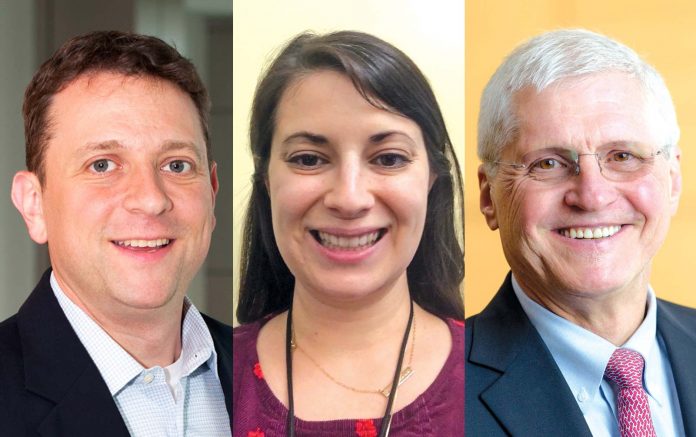(Photo: Gideon Blumenthal, MD, Nicole Drezner, MD, Mark G. Kris, MD)
By Erik J. MacLaren, PhD
Posted: February 2018
The development of immunotherapies and targeted therapies for use in lung cancers has provided less-toxic options for treating these malignancies. Researchers have begun investigating the possibility of using these newer drugs in the neoadjuvant setting, that is, systemic treatments given prior to surgical resection. According to Mark G. Kris, MD, of Memorial Sloan Kettering Cancer Center, an expert on neoadjuvant therapy in lung cancer, the benefits of neoadjuvant trials include being able to estimate endpoints in months rather than the usual 10 to 15 years for adjuvant trials. “There are many good reasons to run neoadjuvant trials,” Dr. Kris said, “but the question is: How do you do it?”
On March 1 and 2, Dr. Kris will be serving as a co-chair of the IASLC-FDA Lung Cancer Neoadjuvant Meeting 2018 in Rockville, Maryland, with the objective of answering that important question.1 “Every speaker has some experience in this space,” he said. “We’re trying to put all those people in the same room to come up with what we know, what we think are today’s standards, and then what questions we need to ask to move forward.”
Gideon Blumenthal, MD, Acting Deputy Director of the U.S. Food and Drug Administration’s (FDA’s) Office of Hematology and Oncology Products, and Nicole Drezner, MD, Medical Officer of the FDA’s Office of Hematology and Oncology Products, have also been involved in organizing the meeting. Both spoke with the IASLC Lung Cancer News about the potential to use neoadjuvant therapies in lung cancer and the goals of this joint meeting.
Q: What are the potential benefits of neoadjuvant therapies to treat lung cancers? Is current interest in this topic justifiable since it is not (necessarily) part of standard practice?
Dr. Blumenthal: One of the advantages of neoadjuvant therapy is an earlier readout of a drug’s effect on the primary tumor because radiographic and pathologic responses are available in real time. In contrast, in the adjuvant setting, it may take many years to see if a new drug has an effect on preventing or delaying relapse. With neoadjuvant trials, it may be possible to design smaller clinical trials with earlier readouts and robust correlative science. Additionally, earlier detection of lung cancers with better screening methods may increase the number of eligible patients for trials in earlier disease stages, such as in the adjuvant and neoadjuvant settings.
We have seen more interest now that active targeted therapies and immunotherapies in lung cancer are available. Available data suggest that giving certain systemic therapy prior to surgery is equivalent to giving it after surgery for patients with early-stage lung cancer. Also, there is precedent for accelerated approval in the neoadjuvant setting for early-stage breast cancer—the targeted therapy pertuzumab was granted accelerated approval in 2014 based on pathologic complete response in the neoadjuvant setting, and it was recently granted full approval based on confirmatory evidence in a large adjuvant trial.
Q: What are the goals of this workshop, and which issues will be addressed?
Dr. Drezner: This workshop will bring together key stakeholders involved in lung cancer clinical research— including regulators, clinicians, patients, industry, and investigators—to discuss the state of current and future neoadjuvant trial design, including incorporation of novel imaging and blood-based biomarkers.
Another important issue to be discussed is the standardization of endpoints in neoadjuvant lung cancer trials and validation of novel endpoints by comparison with established endpoints. In the past year, for example, we have seen more trials using major pathologic response (MPR) as an endpoint when evaluating neoadjuvant therapy in the treatment of patients with early-stage NSCLC. Given the recent shift from cytotoxic chemotherapy to targeted therapies and immune checkpoint inhibitors to treat patients with NSCLC, the evaluation and determination of endpoints such as MPR may change with these new pharmacologic classes of drugs and improved patient outcomes.
Q: Why is the FDA helping to spearhead this workshop?
Dr. Drezner: The FDA Oncology Center of Excellence is charged with helping to expedite the development of oncology therapeutics and to support an integrated approach in the clinical evaluation of drugs, biologics, and devices for the treatment of cancer. At the FDA, we have a unique vantage point as we review applications and provide advice to industry and research sponsors on the design of clinical trials across the lifecycle of drug and diagnostic development. The FDA can also assist in standardizing the design of clinical trials and can aid in the validation or qualification of potential surrogate endpoints, thereby hastening the development process. Given the FDA’s unique position interfacing with representatives from industry, clinicians, and patient advocacy groups and our commitment to making the drug approval process more efficient and innovative, we are excited to partner with the IASLC on this important workshop.
Expected Outcomes
With so many open questions around what Dr. Kris calls the “nuts-and-bolts” issues of designing neoadjuvant trials for lung cancers, this meeting will be an opportunity to begin setting standards going forward. “Representatives from medical oncology, surgical oncology, pathology, radiology and radiation oncology, statistics, industry, and regulators will come together to discuss a wide range of topics pertaining to neoadjuvant endpoints in lung cancer trials,” Dr. Blumenthal said. “Out of this meeting, we hope to potentially publish a white paper or draft guidance to help inform sponsors on best practices when designing neoadjuvant trials for early-stage lung cancer.” ✦
Reference:
1. IASLC-FDA Lung Cancer Neoadjuvant Meeting 2018. International Association for the Study of Lung Cancer website. iaslc.org/events/iaslc-fda-lung-cancer-neoadjuvant-meeting-2018. Accessed January 8, 2018.











